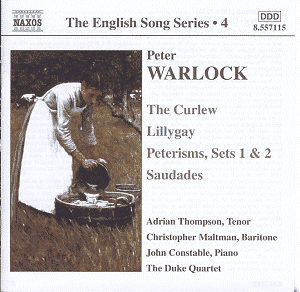The invaluable reissue by Naxos of ‘The English
Song Series’, which first appeared on the Collins Classics label,
continues with this volume devoted to songs by Peter Warlock.
Collectors owe Naxos a real debt of gratitude for their work in
rescuing these recordings from possible oblivion.
The programme presents a good, representative
selection of Warlock’s output of songs. In particular, many show
his great interest in English literature of the sixteenth and
seventeenth centuries. The biggest work, however, sets poetry
by a modern writer, W.B. Yeats. Warlock’s The Curlew, a
cycle of four songs plus an instrumental interlude is a strange
work indeed. The accompaniment for string quartet, flute and cor
anglais is in itself unconventional but the soundworld which the
work inhabits is also highly individual and the prevailing mood
of melancholy is pretty much unrelieved. Many collectors will
be familiar with the classic 1973 version by Ian Partridge and
The Music Group of London (EMI). Frankly, I don’t think this Naxos
version displaces its older rival. The contribution of the instrumental
group is very fine, offering much sensitive playing. In fact,
I don’t think there’s anything to choose between the two versions
on this score. However, I must say that I greatly prefer the singing
of Ian Partridge to that of Adrian Thompson.
Consistently, Partridge sings steadily, with
even production and a steady, well-controlled tone. He is also
extremely responsive to the words. Thompson too is careful with
the words (though not quite as in tune with them as his rival,
I think.) However, Partridge enjoys a clear advantage when it
comes to the sheer sound of the voice. I find that his singing
fall much more pleasingly on the ear; for my taste Thompson has
far too wide a vibrato and often there is a beat in the voice
which I find distracting.
Elsewhere in the recital Thompson is better,
I think. For instance, I thought he was particularly sensitive
in the second song of the first set of Peterisms, ‘A Sad
Song’ (track 11). Unfortunately, however, in the very next song,
‘Rutterkin’, his high notes sound forced and unpleasant. I like
him much more in ‘The Cloths of Heaven’ (track 18) and the fine
‘Sweet and twenty’ (track 21). In fact, as a general rule he impresses
most with his quieter singing. It is when the emotional stakes
are raised (or the volume) that I am less happy with the sounds
he makes. This, however, is very much a matter of personal taste
and not all collectors will share these reservations. My advice
would be to sample a track or two before buying.
For my money the contributions of Christopher
Maltman are much to be preferred. He is yet another in the long
line of excellent English baritones and here he displays the sort
of form which saw him deservedly awarded the Lieder prize at the
1997 Cardiff Singer of the World competition. In comparison with
Adrian Thompson I find that his voice is much more evenly produced
throughout its compass and his delivery sounds a good deal more
natural. Crucially, in louder passages he does not sound under
pressure. Overall, his is a most pleasing sound. He gives a rousing
performance of ‘Peter Warlock’s Fancy’ (track 9) and is most eloquent
in ‘Bright is the ring of words’ (track 14) – though I must say
I don’t think this song is a patch on Vaughan Williams’ setting
of the same text in his Songs of Travel. I also admired
Maltman’s calm restraint in ‘The frostbound wood’ (track 19).
He also sings ‘Bethlehem Down’ (track 20) very well though I believe
the piece works much better in its original SATB version of 1927.
I’ve already praised the accompaniment in The
Curlew. In all the other items the pianist John Constable
provides sterling and most musical support to the singers.
Despite the reservations I’ve expressed about
Adrian Thompson (very much a matter of personal taste, I know)
I welcome the reappearance of this recital. I also warmly applaud
the decision by Naxos not to skimp on documentation despite the
fact that the disc sells at super budget price. Keith Anderson’s
notes are succinct but perfectly serviceable. Crucially all the
texts are supplied. Though both singers’ diction is excellent
quite a number of the texts are far from straightforward and it
is invaluable to have the texts to follow. (The documentation
is in English only, however.) If Naxos can do their customers
the basic courtesy of providing texts why can’t all labels
follow suit?
The recorded sound is good and all in all this
disc provides a most useful introduction to the songs of Peter
Warlock
John Quinn
See also
review by Rob Barnett

